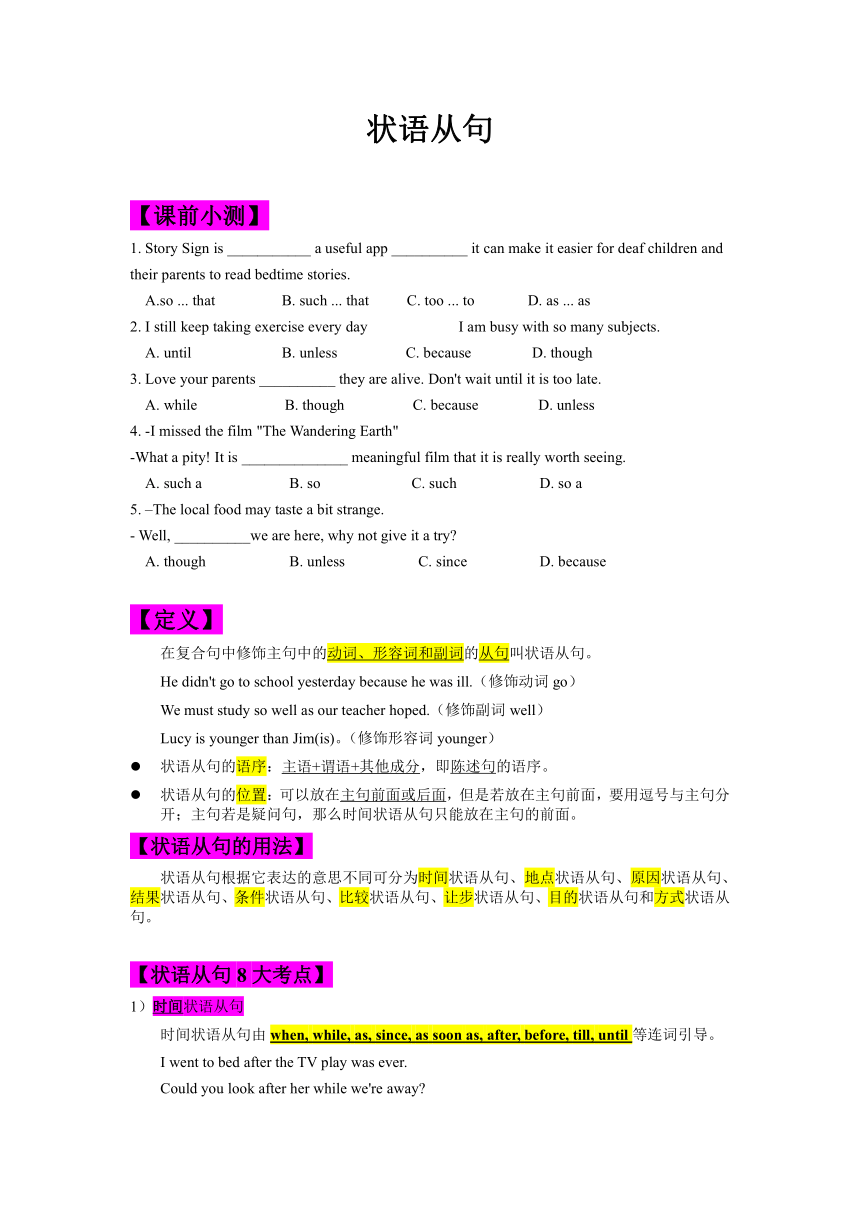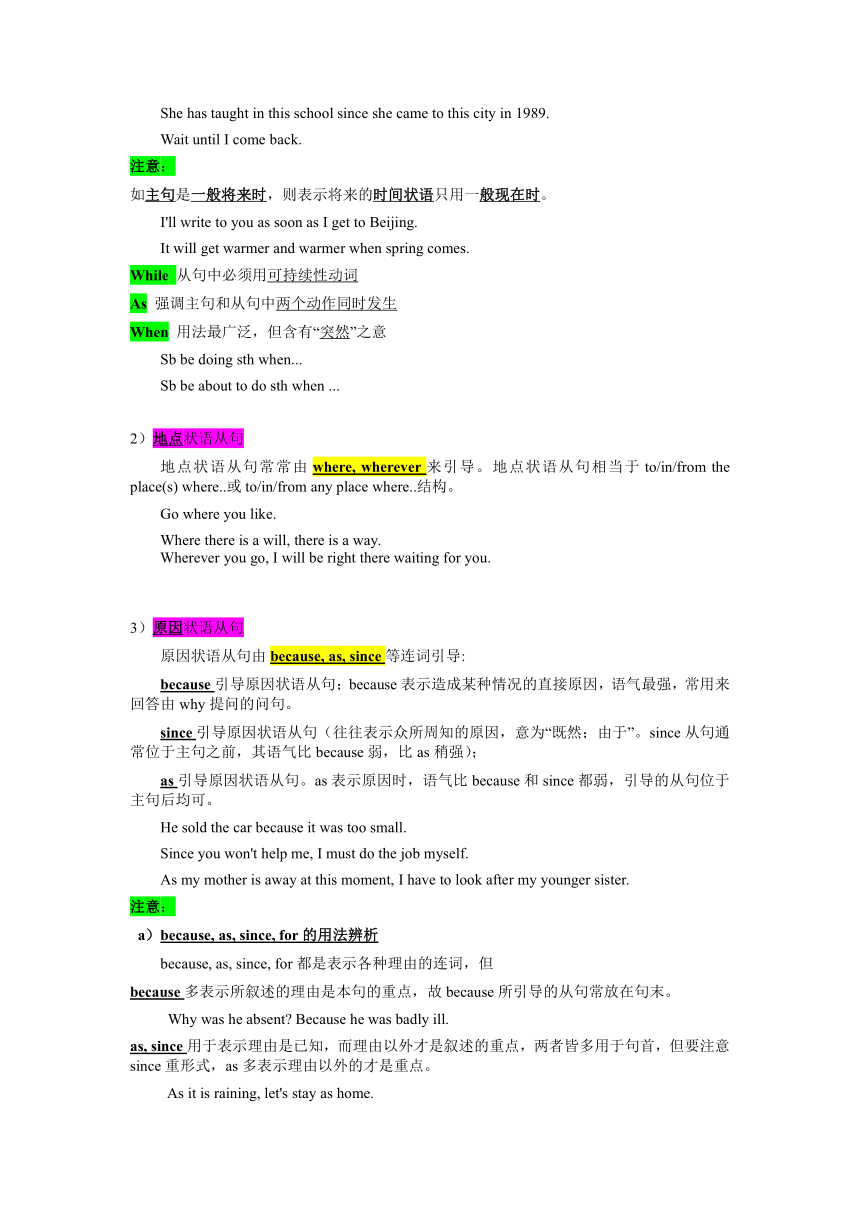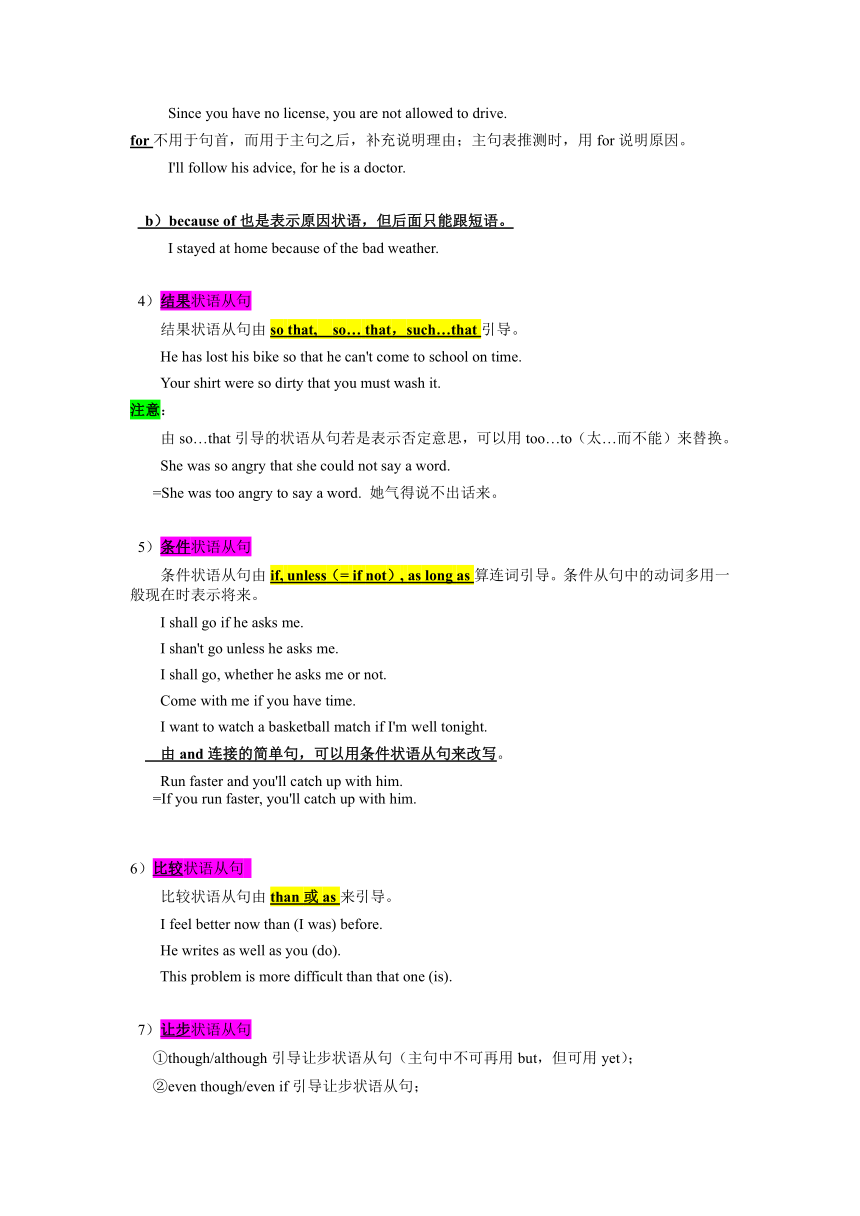2022年中考英语复习状语从句(word版,含讲解和答案)
文档属性
| 名称 | 2022年中考英语复习状语从句(word版,含讲解和答案) |  | |
| 格式 | docx | ||
| 文件大小 | 24.2KB | ||
| 资源类型 | 教案 | ||
| 版本资源 | 通用版 | ||
| 科目 | 英语 | ||
| 更新时间 | 2021-12-22 09:22:19 | ||
图片预览



文档简介
状语从句
【课前小测】
1. Story Sign is ___________ a useful app __________ it can make it easier for deaf children and
their parents to read bedtime stories.
A.so ... that B. such ... that C. too ... to D. as ... as
2. I still keep taking exercise every day I am busy with so many subjects.
A. until B. unless C. because D. though
3. Love your parents __________ they are alive. Don't wait until it is too late.
A. while B. though C. because D. unless
4. -I missed the film "The Wandering Earth"
-What a pity! It is ______________ meaningful film that it is really worth seeing.
A. such a B. so C. such D. so a
5. –The local food may taste a bit strange.
- Well, __________we are here, why not give it a try
A. though B. unless C. since D. because
【定义】
在复合句中修饰主句中的动词、形容词和副词的从句叫状语从句。
He didn't go to school yesterday because he was ill.(修饰动词go)
We must study so well as our teacher hoped.(修饰副词well)
Lucy is younger than Jim(is)。(修饰形容词younger)
状语从句的语序:主语+谓语+其他成分,即陈述句的语序。
状语从句的位置:可以放在主句前面或后面,但是若放在主句前面,要用逗号与主句分开;主句若是疑问句,那么时间状语从句只能放在主句的前面。
【状语从句的用法】
状语从句根据它表达的意思不同可分为时间状语从句、地点状语从句、原因状语从句、结果状语从句、条件状语从句、比较状语从句、让步状语从句、目的状语从句和方式状语从句。
【状语从句8大考点】
1)时间状语从句
时间状语从句由when, while, as, since, as soon as, after, before, till, until等连词引导。
I went to bed after the TV play was ever.
Could you look after her while we're away
She has taught in this school since she came to this city in 1989.
Wait until I come back.
注意:
如主句是一般将来时,则表示将来的时间状语只用一般现在时。
I'll write to you as soon as I get to Beijing.
It will get warmer and warmer when spring comes.
While 从句中必须用可持续性动词
As 强调主句和从句中两个动作同时发生
When 用法最广泛,但含有“突然”之意
Sb be doing sth when...
Sb be about to do sth when ...
2)地点状语从句
地点状语从句常常由where, wherever来引导。地点状语从句相当于to/in/from the place(s) where..或to/in/from any place where..结构。
Go where you like.
Where there is a will, there is a way.
Wherever you go, I will be right there waiting for you.
3)原因状语从句
原因状语从句由because, as, since等连词引导:
because引导原因状语从句;because表示造成某种情况的直接原因,语气最强,常用来回答由why提问的问句。
since引导原因状语从句(往往表示众所周知的原因,意为“既然;由于”。since从句通常位于主句之前,其语气比because弱,比as稍强);
as引导原因状语从句。as表示原因时,语气比because和since都弱,引导的从句位于主句后均可。
He sold the car because it was too small.
Since you won't help me, I must do the job myself.
As my mother is away at this moment, I have to look after my younger sister.
注意:
a)because, as, since, for的用法辨析
because, as, since, for都是表示各种理由的连词,但
because多表示所叙述的理由是本句的重点,故because所引导的从句常放在句末。
Why was he absent Because he was badly ill.
as, since用于表示理由是已知,而理由以外才是叙述的重点,两者皆多用于句首,但要注意since重形式,as多表示理由以外的才是重点。
As it is raining, let's stay as home.
Since you have no license, you are not allowed to drive.
for不用于句首,而用于主句之后,补充说明理由;主句表推测时,用for说明原因。
I'll follow his advice, for he is a doctor.
b)because of也是表示原因状语,但后面只能跟短语。
I stayed at home because of the bad weather.
4)结果状语从句
结果状语从句由so that, so… that,such…that引导。
He has lost his bike so that he can't come to school on time.
Your shirt were so dirty that you must wash it.
注意:
由so…that引导的状语从句若是表示否定意思,可以用too…to(太…而不能)来替换。
She was so angry that she could not say a word.
=She was too angry to say a word. 她气得说不出话来。
5)条件状语从句
条件状语从句由if, unless(= if not), as long as算连词引导。条件从句中的动词多用一般现在时表示将来。
I shall go if he asks me.
I shan't go unless he asks me.
I shall go, whether he asks me or not.
Come with me if you have time.
I want to watch a basketball match if I'm well tonight.
由and连接的简单句,可以用条件状语从句来改写。
Run faster and you'll catch up with him.
=If you run faster, you'll catch up with him.
6)比较状语从句
比较状语从句由than或as来引导。
I feel better now than (I was) before.
He writes as well as you (do).
This problem is more difficult than that one (is).
7)让步状语从句
①though/although引导让步状语从句(主句中不可再用but,但可用yet);
②even though/even if引导让步状语从句;
③wh-ever类词引导让步状语从句(wh-ever类词引导让步状语从句时,常可换成“no matter+相应的wh-词”,在引导名词性从句时只能用wh-ever)。
Though/Although he tried hard, he was not successful.
He went on working though it was very late.
注意:
汉语中的“虽然…但是…”在英语中用连词though就可以了,不能与并列连词but, and, so等连用,但可以与yet, still等连用。
“虽然我很喜欢照顾我姐姐的婴儿,但她不让我干”。
这个句子我们可以用下面两种方法来表达。
Though I like looking after my sister's baby, she doesn't let me do it.
I like looking after my sister's baby, but she doesn't let me do it.
though可以与yet连用,这里yet虽然意思与but相同,但yet不是连词,而是副词。
Though it was cold, yet he went out without a coat.
Although it was expensive, we still decided to buy it.
Though we only stayed there for a few days, we had a good time.
Although he lives alone, yet he is happy. = He lives alone, but he is happy.
时态:让步状语从句的从句和主句时态必须一致,指的是不能有逻辑错误,并不是说从句和主句时态必须完全一样。
目的状语从句
目的状语从句通常由 so that, in order that引导。
We started early so that we could catch the first train.
He studies hard so that he could work better in the future.
We used the computer in order that we might save time.
so that既可引导目的状语从句,又可引导结果状语从句。区别这两种从句的办法有两个:
目的状语从句里往往带有情态动词can, could, may, might等。
从意思上看,目的状语从句往往表示的目的很明确。
Speak clearly so that they may understand you. (目的状语从句)
Jack is badly ill so that he has to rest. (结果状语从句)
9) 方式状语从句
as引导方式状语从句;译为“如同;按...的方式”;
as if/as though引导方式状语从句。
Please finish this task in this way as I told you.
He treats me as if/though I were a stranger.
It looked as if it had been painted.
①方式状语从句所表示的情况是事实或具有很大可能性时,通常用陈述语气。
②方式状语从句所表示的情况不是事实,而是主观的想象或夸大性的比喻,通常用虚拟语气。表示现在的情况用过去式,表示过去的情况用过去完成时。
【需要注意的复习要点】
当整句句子处于过去时的情况下,主句用过去完成时,从句用一般过去时。
当整句句子处于将来时的情况下,总是主句用一般将来时,从句用一般现在时。
由when引导的时间状语从句,句子处于将来时的情况下,与所有的时间状语从句一样,主句用一般将来时,从句用一般现在时。
I am going to be a doctor when I grow up
整句句子处于将来时的情况下,且两个动作同时进行,则持续的那个动作用过去进行时,瞬间的那个动作用一般过去时。
I met my English teacher when I was walking in the street.
He turned on TV set at once when he got home.
整句句子处于过去时的情况下,且两个动作先后发生,when=after,则时态与after一致,主句从句都用一般过去时。
The class had already begun when I entered the classroom.
整句句子处于过去时的情况下,且两个动作先后发生,但这里的when=before,则时态与before一致,主句用过去完成时,从句用一般过去时。
【练习】
1. Grace is going to give much money to charity, ________she is not rich enough.
A. if B. unless C.since D. though
2. Jim has been in the factory for two years _________ he graduated.
A. when B. since C.as soon as D. as
3. You'd better make a good plan_______ you take a holiday.
A. before B. during C.until D.after
4. She raised her voice _______ everyone in the room could hear her.
A. so that B.as soon as C. no matter D. even though
5. He will come here right away ________ he hears the news.
A. so B. as soon as C. because D.though
6. _______I got off the bus, I saw him standing there.
A. While B. When C. If D.Because
7. It's quite common in Britain to say Thank you to the drivers_______ people get off the bus.
A. before B. since C. until D.unless
8. Her little sister is _____ young ______she can't dress herself.
A. too; to B, so; that C. such; that D.very;that
9. _______ his right hand was hurt, _______ he wrote slowly.
A. Because; so B. Because; / C. Although; but D. Although; /
10. Li Lei knew little about the film ______ he saw it yesterday afternoon.
A.if B.since C. until D. because
【课前小测】答案:BDAAC
【练习】答案:DBAAB BABBC
【课前小测】
1. Story Sign is ___________ a useful app __________ it can make it easier for deaf children and
their parents to read bedtime stories.
A.so ... that B. such ... that C. too ... to D. as ... as
2. I still keep taking exercise every day I am busy with so many subjects.
A. until B. unless C. because D. though
3. Love your parents __________ they are alive. Don't wait until it is too late.
A. while B. though C. because D. unless
4. -I missed the film "The Wandering Earth"
-What a pity! It is ______________ meaningful film that it is really worth seeing.
A. such a B. so C. such D. so a
5. –The local food may taste a bit strange.
- Well, __________we are here, why not give it a try
A. though B. unless C. since D. because
【定义】
在复合句中修饰主句中的动词、形容词和副词的从句叫状语从句。
He didn't go to school yesterday because he was ill.(修饰动词go)
We must study so well as our teacher hoped.(修饰副词well)
Lucy is younger than Jim(is)。(修饰形容词younger)
状语从句的语序:主语+谓语+其他成分,即陈述句的语序。
状语从句的位置:可以放在主句前面或后面,但是若放在主句前面,要用逗号与主句分开;主句若是疑问句,那么时间状语从句只能放在主句的前面。
【状语从句的用法】
状语从句根据它表达的意思不同可分为时间状语从句、地点状语从句、原因状语从句、结果状语从句、条件状语从句、比较状语从句、让步状语从句、目的状语从句和方式状语从句。
【状语从句8大考点】
1)时间状语从句
时间状语从句由when, while, as, since, as soon as, after, before, till, until等连词引导。
I went to bed after the TV play was ever.
Could you look after her while we're away
She has taught in this school since she came to this city in 1989.
Wait until I come back.
注意:
如主句是一般将来时,则表示将来的时间状语只用一般现在时。
I'll write to you as soon as I get to Beijing.
It will get warmer and warmer when spring comes.
While 从句中必须用可持续性动词
As 强调主句和从句中两个动作同时发生
When 用法最广泛,但含有“突然”之意
Sb be doing sth when...
Sb be about to do sth when ...
2)地点状语从句
地点状语从句常常由where, wherever来引导。地点状语从句相当于to/in/from the place(s) where..或to/in/from any place where..结构。
Go where you like.
Where there is a will, there is a way.
Wherever you go, I will be right there waiting for you.
3)原因状语从句
原因状语从句由because, as, since等连词引导:
because引导原因状语从句;because表示造成某种情况的直接原因,语气最强,常用来回答由why提问的问句。
since引导原因状语从句(往往表示众所周知的原因,意为“既然;由于”。since从句通常位于主句之前,其语气比because弱,比as稍强);
as引导原因状语从句。as表示原因时,语气比because和since都弱,引导的从句位于主句后均可。
He sold the car because it was too small.
Since you won't help me, I must do the job myself.
As my mother is away at this moment, I have to look after my younger sister.
注意:
a)because, as, since, for的用法辨析
because, as, since, for都是表示各种理由的连词,但
because多表示所叙述的理由是本句的重点,故because所引导的从句常放在句末。
Why was he absent Because he was badly ill.
as, since用于表示理由是已知,而理由以外才是叙述的重点,两者皆多用于句首,但要注意since重形式,as多表示理由以外的才是重点。
As it is raining, let's stay as home.
Since you have no license, you are not allowed to drive.
for不用于句首,而用于主句之后,补充说明理由;主句表推测时,用for说明原因。
I'll follow his advice, for he is a doctor.
b)because of也是表示原因状语,但后面只能跟短语。
I stayed at home because of the bad weather.
4)结果状语从句
结果状语从句由so that, so… that,such…that引导。
He has lost his bike so that he can't come to school on time.
Your shirt were so dirty that you must wash it.
注意:
由so…that引导的状语从句若是表示否定意思,可以用too…to(太…而不能)来替换。
She was so angry that she could not say a word.
=She was too angry to say a word. 她气得说不出话来。
5)条件状语从句
条件状语从句由if, unless(= if not), as long as算连词引导。条件从句中的动词多用一般现在时表示将来。
I shall go if he asks me.
I shan't go unless he asks me.
I shall go, whether he asks me or not.
Come with me if you have time.
I want to watch a basketball match if I'm well tonight.
由and连接的简单句,可以用条件状语从句来改写。
Run faster and you'll catch up with him.
=If you run faster, you'll catch up with him.
6)比较状语从句
比较状语从句由than或as来引导。
I feel better now than (I was) before.
He writes as well as you (do).
This problem is more difficult than that one (is).
7)让步状语从句
①though/although引导让步状语从句(主句中不可再用but,但可用yet);
②even though/even if引导让步状语从句;
③wh-ever类词引导让步状语从句(wh-ever类词引导让步状语从句时,常可换成“no matter+相应的wh-词”,在引导名词性从句时只能用wh-ever)。
Though/Although he tried hard, he was not successful.
He went on working though it was very late.
注意:
汉语中的“虽然…但是…”在英语中用连词though就可以了,不能与并列连词but, and, so等连用,但可以与yet, still等连用。
“虽然我很喜欢照顾我姐姐的婴儿,但她不让我干”。
这个句子我们可以用下面两种方法来表达。
Though I like looking after my sister's baby, she doesn't let me do it.
I like looking after my sister's baby, but she doesn't let me do it.
though可以与yet连用,这里yet虽然意思与but相同,但yet不是连词,而是副词。
Though it was cold, yet he went out without a coat.
Although it was expensive, we still decided to buy it.
Though we only stayed there for a few days, we had a good time.
Although he lives alone, yet he is happy. = He lives alone, but he is happy.
时态:让步状语从句的从句和主句时态必须一致,指的是不能有逻辑错误,并不是说从句和主句时态必须完全一样。
目的状语从句
目的状语从句通常由 so that, in order that引导。
We started early so that we could catch the first train.
He studies hard so that he could work better in the future.
We used the computer in order that we might save time.
so that既可引导目的状语从句,又可引导结果状语从句。区别这两种从句的办法有两个:
目的状语从句里往往带有情态动词can, could, may, might等。
从意思上看,目的状语从句往往表示的目的很明确。
Speak clearly so that they may understand you. (目的状语从句)
Jack is badly ill so that he has to rest. (结果状语从句)
9) 方式状语从句
as引导方式状语从句;译为“如同;按...的方式”;
as if/as though引导方式状语从句。
Please finish this task in this way as I told you.
He treats me as if/though I were a stranger.
It looked as if it had been painted.
①方式状语从句所表示的情况是事实或具有很大可能性时,通常用陈述语气。
②方式状语从句所表示的情况不是事实,而是主观的想象或夸大性的比喻,通常用虚拟语气。表示现在的情况用过去式,表示过去的情况用过去完成时。
【需要注意的复习要点】
当整句句子处于过去时的情况下,主句用过去完成时,从句用一般过去时。
当整句句子处于将来时的情况下,总是主句用一般将来时,从句用一般现在时。
由when引导的时间状语从句,句子处于将来时的情况下,与所有的时间状语从句一样,主句用一般将来时,从句用一般现在时。
I am going to be a doctor when I grow up
整句句子处于将来时的情况下,且两个动作同时进行,则持续的那个动作用过去进行时,瞬间的那个动作用一般过去时。
I met my English teacher when I was walking in the street.
He turned on TV set at once when he got home.
整句句子处于过去时的情况下,且两个动作先后发生,when=after,则时态与after一致,主句从句都用一般过去时。
The class had already begun when I entered the classroom.
整句句子处于过去时的情况下,且两个动作先后发生,但这里的when=before,则时态与before一致,主句用过去完成时,从句用一般过去时。
【练习】
1. Grace is going to give much money to charity, ________she is not rich enough.
A. if B. unless C.since D. though
2. Jim has been in the factory for two years _________ he graduated.
A. when B. since C.as soon as D. as
3. You'd better make a good plan_______ you take a holiday.
A. before B. during C.until D.after
4. She raised her voice _______ everyone in the room could hear her.
A. so that B.as soon as C. no matter D. even though
5. He will come here right away ________ he hears the news.
A. so B. as soon as C. because D.though
6. _______I got off the bus, I saw him standing there.
A. While B. When C. If D.Because
7. It's quite common in Britain to say Thank you to the drivers_______ people get off the bus.
A. before B. since C. until D.unless
8. Her little sister is _____ young ______she can't dress herself.
A. too; to B, so; that C. such; that D.very;that
9. _______ his right hand was hurt, _______ he wrote slowly.
A. Because; so B. Because; / C. Although; but D. Although; /
10. Li Lei knew little about the film ______ he saw it yesterday afternoon.
A.if B.since C. until D. because
【课前小测】答案:BDAAC
【练习】答案:DBAAB BABBC
同课章节目录
- 词法
- 名词
- 动词和动词短语
- 动词语态
- 动词时态
- 助动词和情态动词
- 非谓语动词
- 冠词
- 代词
- 数词和量词
- 形容词副词及其比较等级
- 介词和介词短语
- 连词和感叹词
- 构词法
- 相似、相近词比较
- 句法
- 陈述句
- 一般疑问句和否定疑问句
- 特殊疑问句及选择疑问句
- 反意疑问句
- 存在句(There be句型)
- 宾语从句
- 定语从句
- 状语从句
- 主谓一致问题
- 简单句
- 并列句
- 复合句
- 主谓一致
- 主、表语从句
- 名词性从句
- 直接引语和间接引语
- 虚拟语气
- 感叹句
- 强调句
- 倒装句
- 祈使句
- 句子的成分
- 句子的分类
- 题型专区
- 单项选择部分
- 易错题
- 完形填空
- 阅读理解
- 词汇练习
- 听说训练
- 句型转换
- 补全对话
- 短文改错
- 翻译
- 书面表达
- 任务型阅读
- 语法填空
- 其他资料
